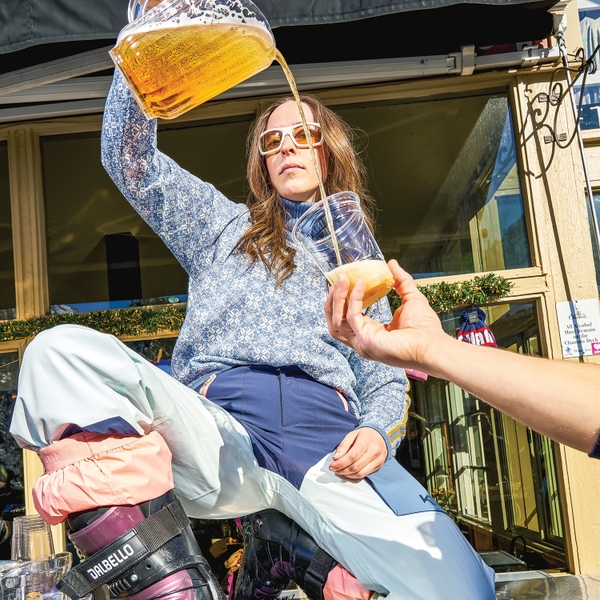Meet the New Queen of Slopeside Fun
Katie Burrell has developed a brand around teaching winter-sports experts and strivers to chill out and share a laugh. Her upcoming film, ‘Weak Layers,’ revives the old party-hard ski comedy—with women at the center of the action.
New perk: Easily find new routes and hidden gems, upcoming running events, and more near you. Your weekly Local Running Newsletter has everything you need to lace up! .
Le Chamois, which locals in Lake Tahoe, California, call the Chammy, is one of those ski-town bars that holds stories in its couches. Pro skiers and weekend warriors have made out and passed out on those leather sofas while the windows steamed after a deep powder day.
On this crisp, snowy night in early December, the Chammy is packed with people wearing bibs and beanies, though none of them have been out on the slopes. They’re extras in Weak Layers, a film starring and directed by , a Canadian comedian, skier, and filmmaker who has made a name for herself in the outdoor world with her slapstick social media content. On-screen, Burrell calls herself a “professional leisure athlete,” which basically means she’s happy to sleep in, then ski the groomers until it’s après time.
In the bar, a stunt double for one of the lead actresses is rehearsing a complicated bit that involves tumbling over a table littered with beers, then cartwheeling over a chairlift hanging from the ceiling before bumping into actor and pro skier KC Deane, who in the script is identified simply as Hot Mystery Man.
One of the extras is pretending to be passed-out drunk on that chairlift swing in the middle of the bar. Burrell, offering direction, points to him and says with a straight face, “Shall we draw a dick on his cheek? Who has a Sharpie?”
The crowd erupts with laughter.
The stunt double practices her tumbling sequence over the table, but it’s more of a graceful dance than a drunken stumble. “It’s too pretty,” Burrell says. “Make it uglier.”
A podcaster once described Burrell as Canada’s Larry David. Her friends think she’s more like Tina Fey. She’s made a career out of poking fun at overly serious, hard-charging mountain-town folks, using the kind of inside jokes that only a fellow skier and mountain biker could pull off. The character she most often plays is a deadpan diva who may be lacking in athletic prowess but offers no shortage of one-liners.
In one video posted to TikTok, she’s seen skinning uphill in a storm. She says to an imaginary boyfriend off-screen, “No, I’m not OK. My feet are no longer with us. I’m holding a funeral for them. Maybe you’d like to say a few words? Like, ‘This is my fault.’ ”
There were bigger names featured in the Daymaker, but Burrell arguably stole the show in a segment where she heli-skis with a group of pros, then squeaks her way into a Freeride World Tour contest, slowly taking the most timid line down the mountain. “Just because there are black diamonds, guys, that doesn’t mean we have to ski them,” she says in the film.





